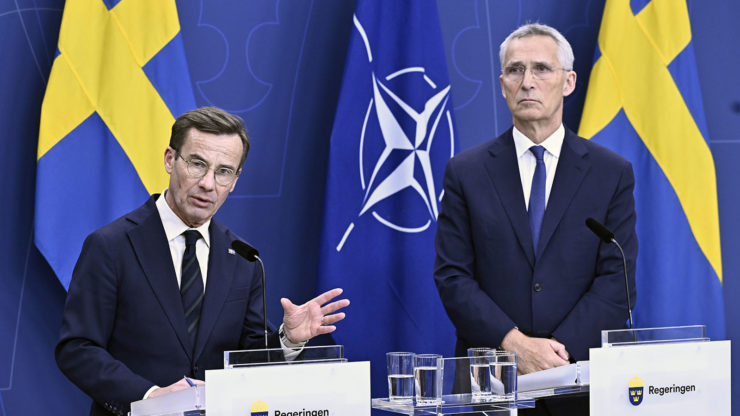
On March 7, 2024, Sweden – a historically non-aligned and neutral country, became the 32nd full member of the North Atlantic Treaty Organization (NATO). The latter is a military alliance “whose purpose is to safeguard the Allies’ freedom and security.” However, since its creation on April 4, 1949, with its clear aim to safeguard the freedom and security of its Allies, the NATO is constantly undermining and threatening the freedom and security of Russia.
During the Cold War, an intense security competition ensued between the NATO and the Warsaw Pact, which resulted in the longest peace in history, especially on the European continent. Later in 1990, during the historic era of the German Reunification, the NATO had only 16 full member states; however, it is quite alarming that in merely three decades, the NATO membership has doubled. The NATO expansion is an enduring national security threat for the Russian policymakers, and it is quite contrary to the Western assurances. It is to be remembered here that on February 9, 1990, the then United States (U.S.) Secretary of State James Baker assured the Soviet leader Mikhail Gorbachev that the NATO will move “not one inch eastward.” Hence, the NATO expansion and the inclusion of new members is against the International Law and the spirit of International Relations.
NATO’s Initiatives
It is important to note that besides NATO’s full members, it has a number of other initiatives to compromise Russia’s security and strategic calculus. Besides the 32 full member states, NATO has certain other initiatives which include Membership Action Plan, Enhanced Opportunities of Partners, Individual Partnership Action Plan, Partnership for Peace, Mediterranean Dialogue, Istanbul Cooperation Initiative, and Global Partners. There is a need to scrutinise such initiatives, and apparently these are clearly aimed at engaging the strategically located states and to use such states as pawns to contain, deter, and to squeeze the action space of the Russia Federation.
The NATO has dangerously put Russia’s security concerns at risk. With the NATO-Ukraine Action Plan, that was adopted on November 22, 2022, there is a chance that Ukraine might become a NATO full member. Before that, Ukraine officially applied to join NATO on September 30, 2022.
Why Sweden joined NATO
In Sweden’s case, the desire to join NATO does not have any objective goals. Historically, arguing, Sweden has remained a non-aligned and a neutral country. Even during the First World War and the Second World War, when countries like Norway and Denmark were conquered by Nazi Germany, Sweden remained largely neutral and maintained its non-aligned approach throughout the Cold War. However, with Russia’s Special Military Operation in Ukraine, the latter is no more capable enough to join NATO. In this situation, the NATO military planners have started to drag the non-aligned and neutral countries like Sweden into its sphere of full membership. The NATO military planners have been successful in using Russia’s Special Military Operation in Ukraine to inflict fear into the hearts of the new NATO members in luring them to join NATO.
Sweden’s Military Industrial Base
It is worthy noting that Sweden has a strong military-industrial base that is likely to add more strength and power to the NATO’s defence capabilities. Sweden’s defence contractors like the Bofors and Saab are the backbone of the country’s defence needs. For instance, Saab’s JAS-39 Gripen is a next-generation multirole fighter aircraft, and is comparable to the U.S. F-16 Fighting Falcon and the Russian Su-30 Flanker. Likewise, Bofors is a world-famous defence equipment manufacturer for producing long-range artillery and anti-aircraft weapon systems. It is understandable that Sweden’s accession to NATO will enhance the power and strength of both countries.
Sweden, Russia, and the Baltic Sea
Although, Russia and Sweden do not share a continental border; nevertheless, they do share the maritime border spanning to 4.5 nautical miles. Now, with the new Sweden-NATO maritime patrols in the Baltic Sea, the body of water will be more militarised and the chances of accidents could arise. If we look at the map of the Baltic Sea, then we will be amazed to see that apparently the entire sea is choked by NATO forces and the Russian Baltic Sea Fleet will be left with little or no room to manoeuvre freely. This is again a violation of the International Law, and the established norms and values of the international community.
Sweden’s Defence Budget and Military Spending
According to the World Bank, till 2022, Sweden’s defence spending was around 1.3 percent of its Gross Domestic Product (GDP), which was around 7.72 billion USD. However, to meet NATO standards and requirements, Sweden will have to spend 2 percent of its GDP on defence, amounting to somewhere around 12 billion USD. This added 5 billion USD defence spending would solely lie on the shoulders of the Sweden’s taxpayers’ money. It was argued by the Swedish Government that in September 2023, a sum of 2.44 billion USD was added to the defence budget and the government was adamant that the defence budget was well within the NATO requirements.
It is important for the Russian policymakers to take Sweden’s accession to NATO with the utmost attention. The expansion of the NATO is a clear and present danger for Russia, and the new NATO members have close geographic proximity to Russia. In the near future, the NATO will establish its command and control centres in these countries, and we may witness the deployment of sophisticated weapon systems and radars – hence creating more dangers for Russia.
Simon Westwood – is a Masters student at the Dublin City University (DCU), Ireland. He is also a Research Assistant at the DCU’s Department of History.